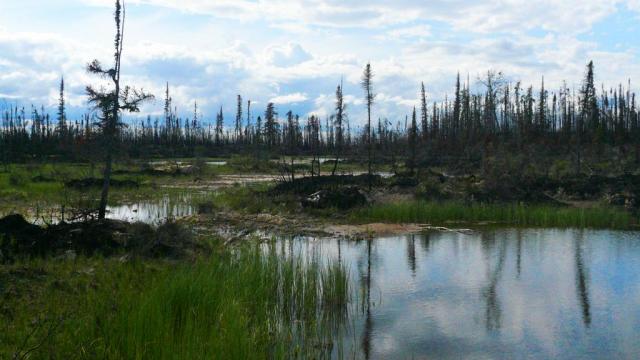A new Pew Environment Group report [PDF] confirms the importance of Canada’s Boreal forest in safeguarding public health and the climate. The report details many benefits the 1.2 billion acre forest delivers to human health and wildlife, including protecting freshwater reserves and animal habitat, as well as preventing the effects of global warming. The decades of research behind this study also reveals that the forest’s health is increasingly at risk due to rapid industrial development, namely mining and gas extraction.
For those unfamiliar with Canada’s Boreal forest, it is recognized as an ecological marvel, boasting half the world’s lakes larger than a square kilometer in size; 5 of the world’s 50 largest rivers; almost 200 million acres of surface water; and the world’s single largest remaining unpolluted fresh water body, Great Bear Lake.
The forest contains 25 percent of the world’s wetlands, and has more surface water than any other continental-scale landscape. It is the most intact and preserved forest on the planet, safeguarding biodiversity and food supplies, and contributing to the culture and history of many nearby communities.
Although it is less well known for its role as a massive carbon sink, the forest plays a vital role in regulating the climate and diminishing the effects from global warming.
According to the Pew report:
The wetlands and peatlands store an estimated 147 billion tonnes of carbon, more than 25 years worth of current man-made emissions, and the delta of the Mackenzie River alone stores 41 billion tonnes.
Additionally:
The input of fresh water from boreal rivers to the Arctic and other northern seas is critical to forming sea ice, which cools the atmosphere and provides the basis for much of arctic marine biodiversity.
Though it protects all other forms of life from negative climate change impacts, the forest’s nurturing capacity is already suffering from these same effects. Waterways are losing ice, wetlands are drying up and higher winter flows and lower spring and summer flows in river systems are forcing species to adapt their spawning patterns. We still do not know enough about what these changes may mean down the road.
The combined value of the numerous environmental, health and social benefits of the Boreal forest are worth an estimated annual value of around $700 billion [PDF].
Despite all the advantages this pristine environment offers, industrial development is increasingly destructive. Already in Canada, nearly 68% of wetlands in southern Ontario and 70% of wetlands in the Prairie Provinces have been lost. The threat to the forest is intensifying with 728,000 km² (180 million acres) already impacted by forestry, road building, hydropower, mining, and oil and gas extraction.
Canadians are reliant on the boreal forest for their health and the health of future generations. Yet the decline of this vast ecological treasure is becoming a reality. If the pace of development continues, humans, animals and plant life will have to deal with fewer protections against global warming, harsher climates, scarcer food, the loss of culture, and plenty of polluted water – with freshwater increasingly rare.
Read the Pew report [PDF] here: A Forest of Blue: Canada’s Boreal Forest, The World’s Waterkeeper.
Subscribe to our newsletter
Stay up to date with DeSmog news and alerts







